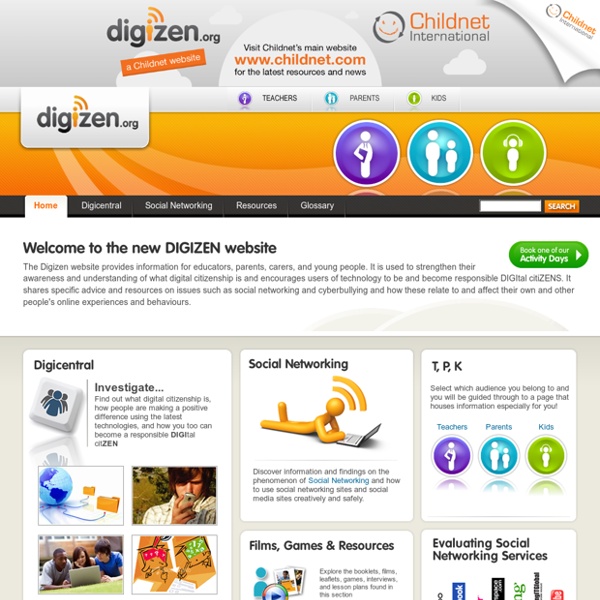



Protect Kids on the Internet Computers are wonderful learning tools, but they can also expose children to dangers like unwanted content and inappropriate contact from adults through the Internet. Parents, educators and caregivers can limit the danger and help children learn to navigate the Internet safely. By protecting their personal information and being cautious about what they view, families can reduce their risks. Set rules. Know what your kids are doing. Talk to them about the dangers.
theconversation Have you seen the how-to video of a teenage girl styling her hair that went disastrously wrong? She was obviously very disturbed by what happened, yet still uploaded the footage onto YouTube. Do you think a 45 or 50 year-old would upload an equivalent video of themselves? 14 Digital Literacy Activities Following a PD session I was involved with yesterday on creating Digital Literacies I have compiled 14 activities with both student and teacher guidance notes included focussing on four aspects of digital literacies. Still Images, Digital Sound, Moving Images and Digital Text. These activities are aimed at students from years 5 - 9 but you could easily adjust them to suit the needs of older and younger students. These activities can be set as either an independent task or as a whole class activity. Still Images Design a Robot This digital learning object allows you to build robots for specific purposes
Lesson Plans – Search Education – Google Picking the right search terms Beginner Pick the best words to use in academic searching, whether students are beginning with a full question or a topic of just a few words. 70% of employers are snooping candidates’ social media profiles Scrolling through your photos from this past weekend and laughing at the debauchery of your Hangover-esque charades? Ranting about your current job or co-workers because you think you're just among "friends?" Think again. According to a new CareerBuilder survey, 70 percent of employers use social media to screen candidates before hiring, which is up significantly from 60 percent in 2016.
Forget coding, we need to teach kids about digital citizenry "Stupid posts about embarrassing incidents or regrettable comments don't just go away because children grow up," writes Asher Wolf. Photo: Stocksy Growing up online is complicated. Social media profiles are increasingly being checked by university admissions boards, potential employers, government departments and insurance agencies. A throwaway comment made online by a child can be life-changing and almost impossible to scrub from the internet decades later. As advertisers, schools and government departments encourage the creation of digital identities for children, the content young people create can hang around like a malicious ghost for decades, searchable online for a lifetime to come.
8 digital skills we must teach our children The social and economic impact of technology is widespread and accelerating. The speed and volume of information have increased exponentially. Experts are predicting that 90% of the entire population will be connected to the internet within 10 years. With the internet of things, the digital and physical worlds will soon be merged. How to Nurture Global Digital Citizenship and Why it Matters to the World One of the questions we’re asked most often is “what is a global digital citizen?” Being a global digital citizen is about more than just being a citizen of Earth. These are leaders, learners, and creators. It’s a way of living well in a world that’s changing fast, and showing others how to do the same. That's why we seek to nurture global digital citizenship in our learners and ourselves: because it matters.
Digital Footprint: not everyone is equal and why unis need to teach managing DF as a 21st century skill Australians are among the most digitally connected in the world and young people spend a lot of time online. Most young Australians have an extensive digital footprint, especially university students. Digital footprints are created through interaction with the internet and social media. Media Literacy: Five Ways Teachers Are Fighting Fake News As the national attention to fake news and the debate over what to do about it continue, one place many are looking for solutions is in the classroom. Since a recent Stanford study showed that students at practically all grade levels can’t determine fake news from the real stuff, the push to teach media literacy has gained new momentum. The study showed that while students absorb media constantly, they often lack the critical thinking skills needed to tell fake news from the real stuff.
I Found It On the Internet, It Must Be True: Fact vs. Opinion for Middle School Students Actual text message exchange between one of the authors of this blog and her child: While this particular fun fact turned out to be entirely true, what caused a double take was the last little bit of this text exchange: “fun facts that I found on the internet.” What makes this conversation even more relevant (and extraordinarily more horrifying) was that we had just finished presenting a session on fake news and information literacy at a conference and here was one of our own flesh and blood finding “facts” on the internet. Developing students' digital literacy The issue Even today’s students need support with some areas of digital practice, particularly in an academic context, so it’s important to make sure that these needs are met. While employability is an obvious driver, developing learners who can learn and thrive in a digital society is a key role for universities and colleges. We define digital literacies as the capabilities which fit someone for living, learning and working in a digital society.